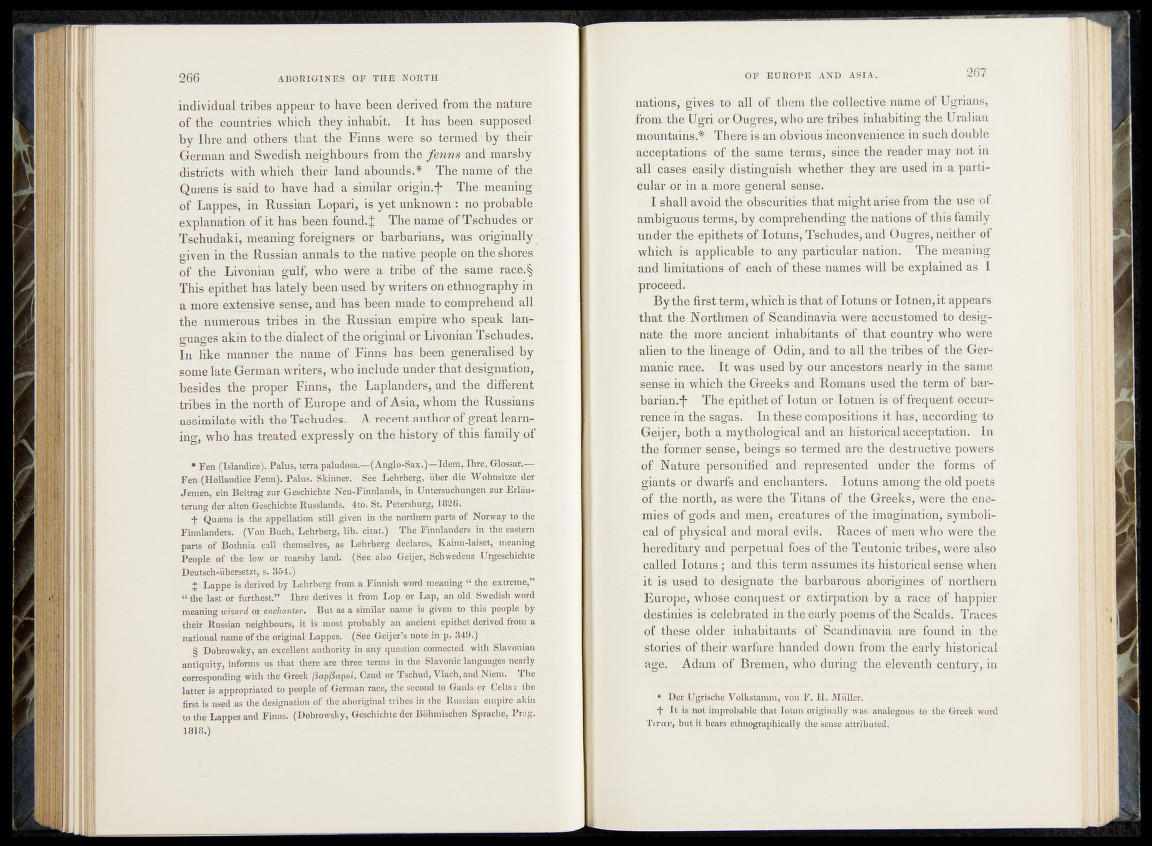
individual tribes appear to have been derived from the nature
of the countries which they-inhabit. It has been supposed
by Ihre and othersithat the Finns were« so . tdrmfed by their
German and Swedish neighbours from the fen n s and marshy
districts with which their land abounds.* The name of the
Quaens is said to have had a similar origim-}* The meaning
of Lappes,rih Russian Lopari, is yet unknown : no probable
explanation of it has been found.J—The name of Tschudes or
Tschudaki, meaning foreigners or barbarians, was originally-
given in the Russiamannals to the native people ontheshores
of the Livonian gulf, who were a tribe of the same race.§
This epithet has lately been used by writers on ethnography in
a more extensive sense, and has been made to comprehend all
the numerous tribes in the Russian empire who speak languages
akin to the dialect of the original or Livonian Tschudes.
In like manner the name of Finns häs*- been generalised.by
some late German writers, who include under that designation,
besides the proper Finns, the Laplanders, and the different
tribes in the north of Europe and of Asia, whom the Russians
assimilate with the Tschudes. A recent .author of great learning,
who has treated expressly on the history of this family n f • *§
• Fen (Islandice). Palus, terra. päludosa.—(Anglo-Sa^d^d«l0 ;^T^^JoiBaT^^S
Fen (Hollaodice Fena). Palus. Skinner. See Lehtberg, fiber die Wohnsitze der
Jemen, em Beitrag zur Geschichte Nen-Finnlands, in Untersuchungen zur Erläuterung
der alten Geschichte Russlands. 4to. St. Petersburg, 1826.
f Quaens is the appellation still given in the northern parts of J^w ay l& ijk e
Finnländers. (Von Buch, Lehrberg, lib. citat.) The Finnländers in the eastern
parts of Bothnia _call themselves, as Lehrberg declares, Kainu4aiset, jneanibg
People of the" low or marshy land. (See also Geij% Schwedens Uj^eschidhtb
Deutsch-fibersetzt, s. 354.) ~
+ Lappe is derived by Lehrberg from a Finnish word meaning “ the extreme,”
m the last or furthest” Ihre derives it from Lop or Lap, an old Swedish word
meaning w iz a r d or en c h a n te r . But as a similar name is given to this people by
t^oir Bngcian rw.jgTiKmirfi, it is most prpbably an ancient epithet derived from a
national name of the original Lappes. (See Geijer’s note in p, 349.)
§ Dobrowsky, an excellent authority in any question .connected with Slavonian
antiquity, informs us that there are three terms in the Slavonic languages nearly
corresponding with the Greek ß a p ß a p o i , Czud or Tschad, Viach, and Mem. The
latter is appropriated to people of German race, the second to Gauls or Celts| the
first is used as the designation of the?aboriginal tribes in the-Bussian empire akin
to the Lappes and Finns. (Dobrowsky, Geschichte der Böhmischen Sprache, Prag.
1818.)
nations, gives<tO- all of theihr*the> collective name of Ugrians,
froup. the Ugri or Ougres, who are tribes inhabiting the Uralian
mountains.* The resist an obvious'inconvenience in such double
acceptations c f the same terms, since the reader may not in
all cases easily distinguish whether they are used in a particular
or in a more'general sense. ;
I shall avoid the obscurities that might arise from the use of
ambiguous terms, by comprehending thenatiins of this family
under the epithets of lotuns,-Tschudes, and Gugres, neither of
whick vis applicable to any particular nation. The meaning
and limitations of each of these names will be explained as I
proceed.
By the first term, whicMs that of lotuns or Iotncn, it appears
that the Northmen of Scandinavia were accustomed to designate
the more ancient inhabitants of that country who were
alien; to the lineage of Odin, and to all)the tribes of the Germanic
race. ■ It'was used by .our ancestors nearly in th e same
sense in which the Greeks-and Romans used the term of bar-
barian.-f* The epithet of iotun orsTletfieri;as^f^equent b<^uife
rence.in tffe .sagas. In these compositions it has, according to
Geij er, both a mythological and an historical acceptation. In
the*-former sense, beings so termed are the destructive powers-
of Nature personified and represented under the forms of
giants or dwarfs and enchanters... lotuns among the old poets
of the north, as were the Titans of the Greeks, were the enemies
of gods and menr creatures o fth e imagination, symbolical
of physical and moral .evils. Races of men who were the
hereditary and perpetual foes of the Teutonic tribes, were also
called lo tu n s; and this term assumes its historical sense when
it is used to designate the barbarous aborigines of northern
Europe, whose conquest or extirpation by a race of happier
destinies is celebrated in the early poems of the Scalds. Traces
of these older inhabitants of Scandinavia are found in the
stories of their warfare handed down from the early historical
age. Adam of Bremen, who during the eleventh century, in
* DerJUgrische Volkstaram, von F. H. Muller.
*1* I t is not improbable that Iotun originally;was analogous to the Greek word
Tir a V f but it bears ethnographical! y th e sense attributed.